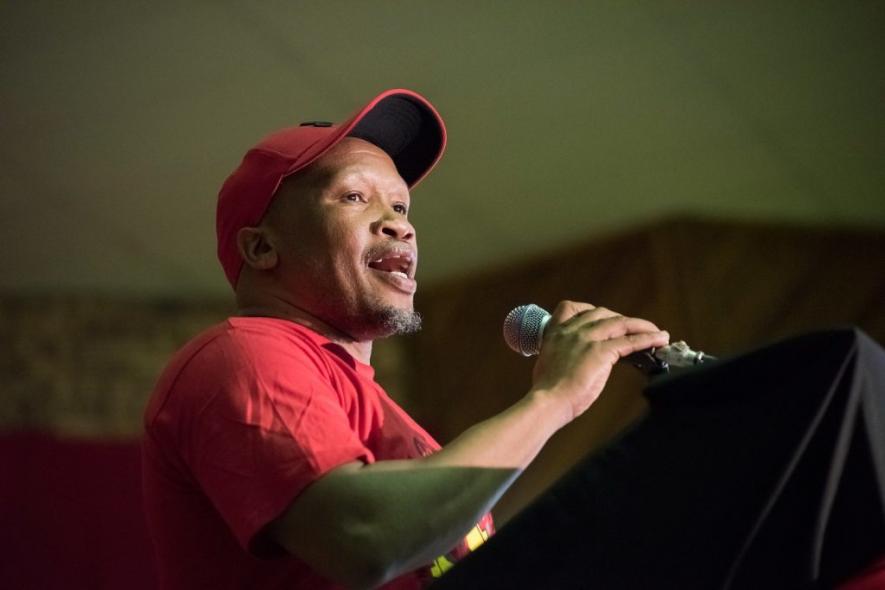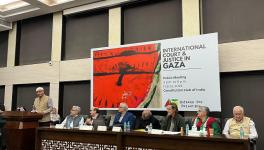South African Unions Remain Resolute as Bus Strike Enters 17th Day

May 1, 2018: NUMSA General Secretary Irvin Jim addressing SAFTU's May Day rally in Bloemfontein. Picture: Madelene Cronje for New Frame
The last few weeks have been of vital importance for the labor movement in South Africa. In addition to the historic strike by the South African Federation of Trade Unions (SAFTU) on April 25 and the massive mobilizations on May 1, the country-wide bus strike that has been going on for 17 days is yet another instance of labor power asserting itself for better working conditions.
On April 17, the National Union of Metalworkers of South Africa (NUMSA) and other unions called upon their members in the bus sector to embark on a national protected strike from the next day. Over 17, 000 bus drivers across the country heeded the call. According to NUMSA, the call for the strike was made after the employers had “consistently frustrated wage talks”, which left the unions with no other option.
It is important to note that on March 16, when the Commission for Conciliation, Mediation and Arbitration (CCMA) declared the negotiations deadlock, employers had a 30-day cooling-off period during which they could have made a better offer to prevent the workers from going on strike, but opted not to use it.
Initially, the workers were demanding a 12% increase, but at the request of the CCMA, the unions were willing to reduce their demand to a 9.5% hike. However, the employers did not budge from their initial offer of 7%, leading to a breakdown of the negotiations called by the Minister of Transport, together with the Minister of Labour. In a joint statement, the unions, including NUMSA, argued that “employers in the sector have insulted workers and commuters by refusing to engage meaningfully during the CCMA- sponsored mediation.”
The unions also demanded that long-distance bus drivers be paid in full for the hours they spend in buses. Employers currently pay the drivers only for the time they spend behind the wheel, while the time they spend as alternative drivers on long-distance trips goes uncompensated. Another key union demand was a hike in subsistence allowance. Drivers often sleep in the buses, and work without proper rest. NUMSA has argued that this exploitation of bus drivers is a major cause of road accidents, as more and more drivers are deprived of sleep.
The unions have been demanding an end to outsourcing. They also want employers to comply with the Basic Conditions of Employment Act (BCEA) night shift regulations. The bus sector is using its own night shift model, which robs workers of the full allowances guaranteed by the BCEA.
A large section of the population of South Africa, especially the working class, uses buses to travel to and from places of work and study. Monthly passes are extremely popular among many, who prefer the option to paying for taxis every day. While commuters are likely to endure difficulties during the strike, unions have urged the public to show solidarity with the bus drivers. Incidentally, as per the South African law regulating labor strikes, the workers who are demanding higher wages will not be paid for the days they stay off work.
The bosses of the transport sector, which is heavily subsidized by the government, will not feel the impact of the strike immediately and hence, are unwilling to hear the demands of the workers. At the same time, they have showed a willingness to let thousands of commuters in townships and villages suffer without transport. The employers benefit from taxpayers’ money, while bus drivers work under appalling conditions and earn slave wages.
In the aftermath of May Day, NUMSA and other unions in the sector vowed to intensify the strike across the country. This is after the employers made an offer that unions considered an insult to worker and commuters. According to a NUMSA statement, employers offered a non-alterable agreement of two years with a wage increase of 8% in the first year and 8.5% in the second year, on condition that unions drop the other essential demands.
On May 3, SAFTU called upon its members across the country to stand in solidarity with the bus drivers by picketing and marching to the offices bus companies.
Get the latest reports & analysis with people's perspective on Protests, movements & deep analytical videos, discussions of the current affairs in your Telegram app. Subscribe to NewsClick's Telegram channel & get Real-Time updates on stories, as they get published on our website.
























